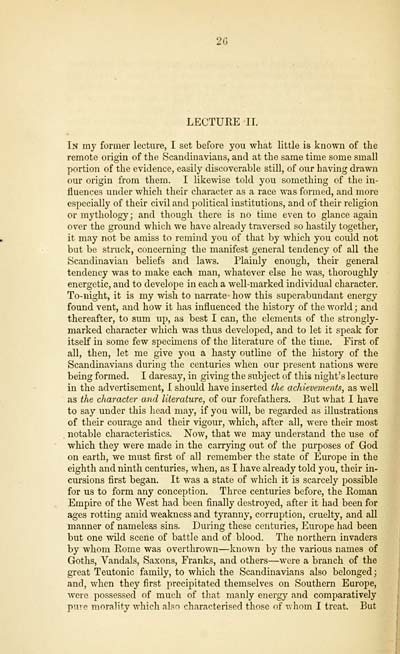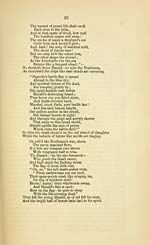Download files
Complete book:
Individual page:
Thumbnail gallery: Grid view | List view

2G
LECTURE 11.
In my former lecture, I set before you what little is known of the
remote origin of the Scandinavians, and at the same time some small
portion of the evidence, easily discoverable still, of our having drawn
our origin from them. I likewise told you something of the in-
fluences under which their character as a race was formed, and more
especially of their civil and political institutions, and of their religion
or mythology; and though there is no time even to glance again
over the ground which we have already traversed so hastily together,
it may not be amiss to remind you of that by which you could not
but be sti'uck, concerning the manifest general tendency of all the
Scandinavian beliefs and laws. Plainly enough, their general
tendency was to make each man, whatever else he was, thoroughly
energetic, and to develope in each a well-marked individual character.
To-night, it is my wish to narrate- how this superabundant energy
found vent, and how it has influenced the history of the world ; and
thereafter, to sum up, as best I can, the elements of the strongly-
marked character which was thus developed, and to let it speak for
itself in some few specimens of the literature of the time. First of
all, then, let me give you a hasty outline of the history of the
Scandinavians during the centuries when our present nations were
being formed. I daresay, in giving the subject of this night's lecture
in the advertisement, I should have inserted the achievevienfs, as well
as the character and literature, of our forefathers. But what I have
to say under this head may, if you will, be regarded as illustrations
of their courage and their vigour, which, after all, were their most
notable characteristics. Now, that we may understand the use of
which they were made in the caiTying out of the purposes of God
on earth, we must first of all remember the state of Europe in the
eighth and ninth centuries, when, as I have already told you, their in-
cursions first began. It was a state of which it is scarcely possible
for us to form any conception. Three centuries before, the Roman
Empire of the West had been finally destroyed, after it had been for
ages rotting amid weakness and tyranny, corruption, cruelty, and all
manner of nameless sins. During these centuries, Europe had been
but one wild scene of battle and of blood. The northern invaders
by whom Rome was overthrown — known by the various names of
Goths, Vandals, Saxons, Franks, and others — were a branch of the
great Teutonic family, to which the Scandinavians also belonged;
and, when they first precipitated themselves on Southern Europe,
were possessed of much of that manly energy and comparatively
pure morality which also characterised those of whom I treat. But
LECTURE 11.
In my former lecture, I set before you what little is known of the
remote origin of the Scandinavians, and at the same time some small
portion of the evidence, easily discoverable still, of our having drawn
our origin from them. I likewise told you something of the in-
fluences under which their character as a race was formed, and more
especially of their civil and political institutions, and of their religion
or mythology; and though there is no time even to glance again
over the ground which we have already traversed so hastily together,
it may not be amiss to remind you of that by which you could not
but be sti'uck, concerning the manifest general tendency of all the
Scandinavian beliefs and laws. Plainly enough, their general
tendency was to make each man, whatever else he was, thoroughly
energetic, and to develope in each a well-marked individual character.
To-night, it is my wish to narrate- how this superabundant energy
found vent, and how it has influenced the history of the world ; and
thereafter, to sum up, as best I can, the elements of the strongly-
marked character which was thus developed, and to let it speak for
itself in some few specimens of the literature of the time. First of
all, then, let me give you a hasty outline of the history of the
Scandinavians during the centuries when our present nations were
being formed. I daresay, in giving the subject of this night's lecture
in the advertisement, I should have inserted the achievevienfs, as well
as the character and literature, of our forefathers. But what I have
to say under this head may, if you will, be regarded as illustrations
of their courage and their vigour, which, after all, were their most
notable characteristics. Now, that we may understand the use of
which they were made in the caiTying out of the purposes of God
on earth, we must first of all remember the state of Europe in the
eighth and ninth centuries, when, as I have already told you, their in-
cursions first began. It was a state of which it is scarcely possible
for us to form any conception. Three centuries before, the Roman
Empire of the West had been finally destroyed, after it had been for
ages rotting amid weakness and tyranny, corruption, cruelty, and all
manner of nameless sins. During these centuries, Europe had been
but one wild scene of battle and of blood. The northern invaders
by whom Rome was overthrown — known by the various names of
Goths, Vandals, Saxons, Franks, and others — were a branch of the
great Teutonic family, to which the Scandinavians also belonged;
and, when they first precipitated themselves on Southern Europe,
were possessed of much of that manly energy and comparatively
pure morality which also characterised those of whom I treat. But
Set display mode to: Large image | Transcription
Images and transcriptions on this page, including medium image downloads, may be used under the Creative Commons Attribution 4.0 International Licence unless otherwise stated. ![]()
| Early Gaelic Book Collections > J. F. Campbell Collection > Our Scandinavian forefathers > (32) |
|---|
| Permanent URL | https://digital.nls.uk/81096375 |
|---|
| Description | Volumes from a collection of 610 books rich in Highland folklore, Ossianic literature and other Celtic subjects. Many of the books annotated by John Francis Campbell of Islay, who assembled the collection. |
|---|
| Description | Selected items from five 'Special and Named Printed Collections'. Includes books in Gaelic and other Celtic languages, works about the Gaels, their languages, literature, culture and history. |
|---|

